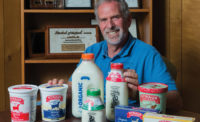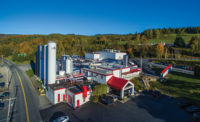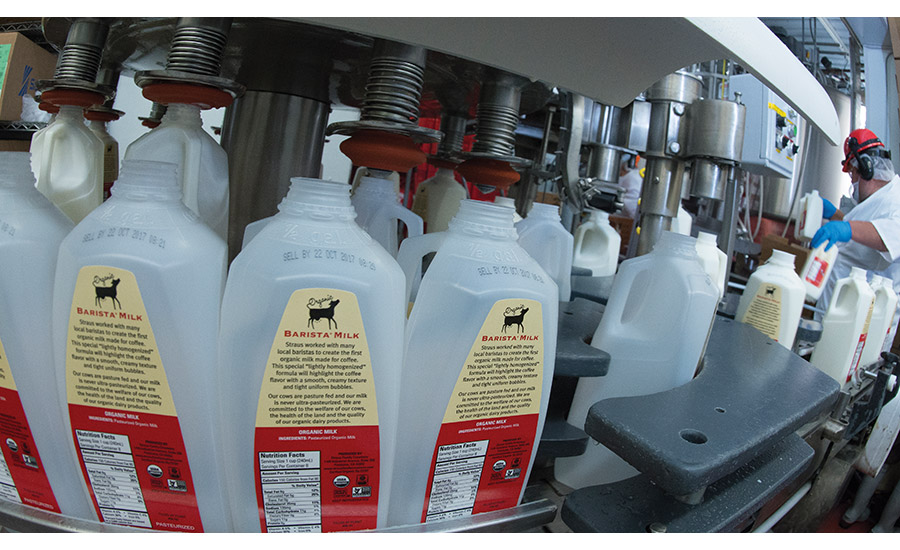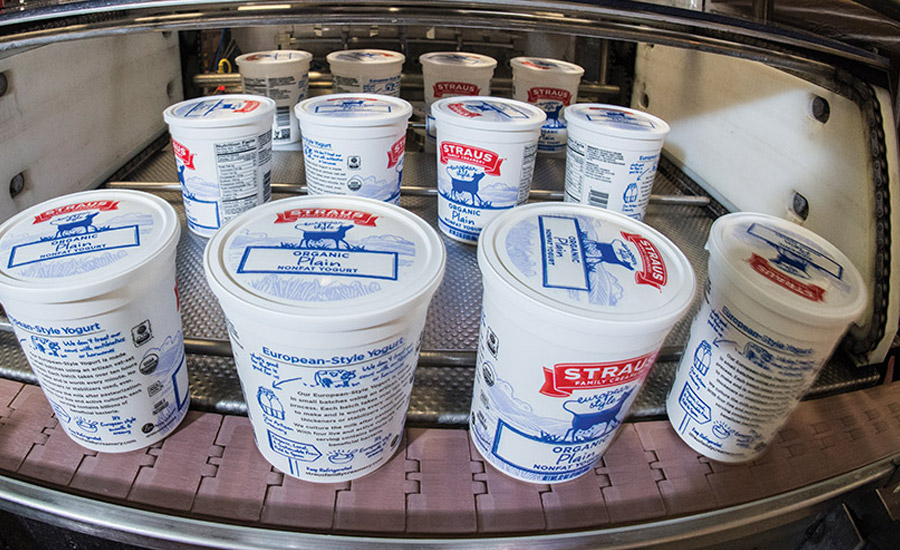Inside the plant: Straus Family Creamery's formidable foundation
The quest for greater efficiencies and worker welfare are prominent in Straus Family Creamery’s manufacturing strategies.

Equipment fills half-gallon bottles with Straus Family Creamery’s Barista milk.

Straus’ Barista milk is the first organic milk made for coffee.

Straus employees apply labels to filled glass milk bottles.

Cartons of Straus Family Creamery European-style organic plain yogurt — made in small batches using an artisan vat-set process — come off the production line and then are packaged and stacked.

Cartons of Straus Family Creamery European-style organic plain yogurt — made in small batches using an artisan vat-set process — come off the production line and then are packaged and stacked.

Ice cream boxes are sealed in preparation for transport.

Straus employees place glass milk bottles into the bottle washer.







Straus Family Creamery is packing a lot of activity into relatively little space.
As the company prepares to build a new processing facility — one that will more than double its current 16,000 square feet to approximately 40,000 square feet — it is working to maximize production rates and efficiencies at the Marshall, Calif., plant in which it has been operating since the company’s inception in 1994.
The plant produces a range of organic dairy selections in a variety of sizes, including eight milk and cream products; 11 flavors of ice cream; seven European-style yogurt products; four Greek yogurt products; two butter products and one sour cream product. Selections for specialty and wholesale markets, the company said, include milk and cream, Barista milk, whipping cream, yogurt, butter, ice cream, soft serve ice cream mix and ice cream base.
The creamery, meanwhile, is steadily rolling out new selections. Launches in 2017 include chocolate milk and two varieties of Greek yogurt — whole-milk vanilla and low-fat plain. A reformulation of raspberry and banana ice creams now includes chocolate chips. In addition, in 2016, Straus Family Creamery added half-pound butter packages, as well as an 8-ounce sour cream offering and two new ice cream flavors: lemon gingersnap and strawberry.
Read more about Straus Family Creamery
The creamery also operates a certified antibiotic screening lab and a food testing lab (chemical and microbiology). In addition, it has two 10,000-gallon and two 20,000-gallon silos, the company noted.
Straus Family Creamery has approximately 135 employees, including approximately 85 at the Marshall processing facility who work in three shifts: preparation, production and sanitation.
A 25,000-square-foot warehouse in Petaluma, meanwhile, has four loading bays and about 20 employees, the company said. The warehouse was relocated to Petaluma from the Marshall facility in 2010 because of the need for more space.
Whereas product distributors previously retrieved all finished products from the Marshall site, Straus Family Creamery now transports inventory to its warehouse for distribution to retail and specialty outlets. Aside from milk, which goes directly to the creamery, suppliers ship all product ingredients to the warehouse.
Those supplies include milk from the Straus Dairy Farm, which operates with 275 dairy cows and 500 acres of pasture in west Marin County on the Northern California coast.
Complacency is not in the cards
A boost in efficiencies is part of Straus Family Creamery’s changing dynamics.
In May 2014, the creamery began using software from Miami-based Redzone to evaluate the efficiency of its manufacturing procedures. The technology gauges such elements as machine speed and production capacity, the company noted.
Robert McGee, Straus Family Creamery’s president, said initial measurements revealed that the creamery was operating at about 50% efficiency — and subsequently wasting a lot of time and money.
“We weren’t producing as much product as we could to fill our growing business,” he stated. “By utilizing the software and training our team, the efficiency rate is now close to 80%. It enables us to receive factual data on the state of the operations rather than just getting people’s opinions.”
The system also spotlights the elements that can contribute to greater efficiencies, including equipment upgrades and more employee training, he said.
By using Redzone on their iPad computer tablets, supervisors are able to view metrics that illustrate the performance of the various processing lines, which also enhances worker engagement, McGee stated.
“Employees can point to the factors that can help make the operation better and more efficient, even at the line operator level,” he said. “That creates more of an ownership feeling and the belief that the workers are participating in the success of the business.”
Along with such technologies, Straus Family Creamery is using a continuous improvement coach to help implement lean manufacturing techniques and further pinpoint operational inefficiencies, McGee said.
Other upgrades include the implementation of an automated case packer to the yogurt line in 2013, which is enabling the creamery to save about 500,000 pounds of cardboard annually, said Albert Straus, founder and CEO. While the company previously would package yogurt in heavy and dense boxes, it now uses a lightweight corrugated pad/shrink wrap packaging system.
The technology also enhances worker safety by freeing employees from packing boxes manually
with constant repetitive motions, Straus stated.
A wink to worker well-being
Indeed, employee welfare is a major company concern. Straus Family Creamery has a full-time safety manager who educates workers on techniques and monitors safety guidelines in all facilities, which is resulting in minimal workers’ compensation claims, Straus said.
“It is important to be as proactive as possible, because being reactive is too late if an employee is already injured,” McGee added.
McGee meets monthly with both the safety manager and the head of Straus Family Creamery’s People & Culture team to review processes and technologies and determine if revisions and upgrades are necessary.
A major focus of the People & Culture team, which is bilingual — English and Spanish, is to give workers a voice in accurately explaining cultural differences so leaders and other team members understand the employees’ point of view and needs. In addition, the company’s leadership is able to communicate important information correctly in a timely fashion to team members.
All employees receive safety training — after first joining the company, as well as periodically during the year — and regular work team “huddles” also are enabling employees to discuss topics related to worker safety, food safety and food quality, McGee noted.
Straus Family Creamery also holds quarterly employee meetings to discuss activities from the previous 90 days and what is likely to occur in the future, McGee stated.
A key company emphasis, he noted, is to remind workers that the company, unlike manufacturers in many other industries, is producing products that people are putting into their bodies, “including those that are near and dear to them.”
Food quality is in the bull’s eye
Indeed, greater food safety also is a major target. In addition to a company safety manager, Straus Family Creamery has two full-time trainers teaching employees key food preparation and handling techniques and quality control elements. An outside consultant also routinely holds sessions to ensure workers remain vigilant, while materials vendors instruct employees how to properly operate their equipment and handle chemicals.
Ensuring that all workers follow the most effective food safety practices is vital if the creamery is to meet regulatory standards, McGee said.
The California Department of Food and Agriculture inspects Straus Family Creamery’s facilities quarterly with a focus on such elements as handling and processing, the company noted. In addition, FDA evaluates the company’s facilities twice yearly, and a third-party auditing firm does an independent inspection of handling practices as part of the creamery’s Hazard Analysis and Critical Control Points food safety management system.
Another ongoing focus is compliance with FDA’s Food Safety Modernization Act as new regulations take hold. The act, signed into law in 2011, is intended to shift the focus of federal regulators from responding to issues to preventing them.
Other training elements include videos, which McGee calls “powerful” because they enhance comprehension by enabling workers to observe techniques instead of just reading materials. Straus Family Creamery also plans to expand its online training system as computer-based programs give employees more flexibility in scheduling days and times to access the tools, he stated.
“We are looking at further improving and enhancing our quality programs over the next couple of years to ensure we are taking advantage of the latest technology and understanding how to best handle products,” McGee said.
Because about 80% of Straus Family Creamery workers are Latino, all training, materials and company meetings are bilingual.
“One of the first questions we ask when selecting suppliers is if their materials are in Spanish,” McGee said. “Being able to communicate with our team in their native language is a key decision criterion.”
While the Redzone applications are primarily in English, most of the data appear in easy-to-comprehend graphs and pictures, he noted.
A plan for managing labor pains
The company trains workers to handle their specific jobs, but also will provide extra compensation to individuals who learn how to master additional pieces of equipment or have the skills to work in multiple processing lines.
“It is a way for a relatively flat organization to give people an opportunity to grow in their jobs and careers,” McGee stated. “Having additional skills makes the workers more valuable to the operation, and they should be compensated for their time, effort and flexibility.”
Maintaining a strong base of workers, however, remains a key operational challenge, Straus said.
“That is especially difficult in California because we have low unemployment and there is no immigration,” he stated, adding that the labor pool also is limited because many people can’t afford to live and work in the same community, and some are reluctant to commute.
McGee, who joined the company in 2011 and became president in 2014, agreed, noting that while Straus Family Creamery has workers who have been with the company more than 20 years, it still must deal with turnover.
Many employees live in the Santa Rosa area, which is about 35 miles from the Marshall creamery, yet other potential workers seek jobs closer to home, he said.
“Once employees understand and appreciate what the company is about — the relationships we have with the workers, the quality of the products we produce and what we are trying to accomplish — they tend to stay,” he noted. “But sometimes that doesn’t resonate.”
While Straus Family Creamery and its family farm suppliers weren’t affected by the recent wildfires in Northern California, more than 25 Straus employees who live in the Santa Rosa area evacuated their homes. And a few lost their homes.
“Our Petaluma office became a safe haven during the first few days of the evacuation,” Straus said. “We’ve been supporting our community with product donations and transportation and will continue to identify ways to be of service in our community during the rebuilding phase.”
To attract and retain workers, McGee said it is important for the company to demonstrate how it values employees by also offering appropriate rewards, recognition and incentive programs. Compensation packages include employee purchase discounts, free English-as-a-second-language classes, carpool incentives, bike to work subsidies and subsidized gym memberships.
In addition, the company has profit-sharing incentives and a company-matching 401(k) program. It also offers regular “Lunch and Learn” programs that employees or local community members facilitate to provide the latest information on such topics as wellness, sustainability, waste recycling and local farming.
Straus Family Creamery leverages a variety of methods to connect with potential workers, too. That includes using such online resources as LinkedIn and the company website, as well as paying current workers a bonus for finding new employees.
“It is a powerful recommendation if a long-time employee feels that a particular individual is the right person to join the team,” McGee said.
Employment agencies, meanwhile, will supply temporary workers for four months and, if the relationship is right, the individuals will often become full-time employees, he stated.
“The Sonoma County unemployment rate is 2 to 3%, so it is a very difficult environment,” McGee said.
To help bolster the local workforce, Straus Family Creamery is part of the Career Technical Education Foundation of Sonoma County, an organization of business, education, elected and private individuals that provides funding to enable individuals to develop the necessary technical skills to work in area industries.
Having a robust and skillful workforce is vital if the company is to meet its objectives of rolling out new selections, remaining innovative and continually seeking ways to cut waste and enhance sustainability.
“It is part of our DNA and extends to the relationships with the family farms and how we develop products,” McGee stated. “Just because the rest of the world might let something go down the drain doesn’t mean that we are going to do that, too.”
Future plans include the launch of more lower-fat items and leveraging the latest technologies to enhance operations.
“Innovations, whether it is around manufacturing, new products or how we tell our story, often yield multiple benefits, which we can share with our customers and our consumers to help them understand why we are a little different,” McGee stated. “The company is not only working to provide healthful, minimally processed organic dairy products that taste great, but to accomplish more societal goals around sustainability, rural communities and sustainable family farming.”
Photos by Vito Palmisano
Looking for a reprint of this article?
From high-res PDFs to custom plaques, order your copy today!












